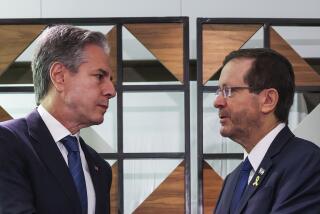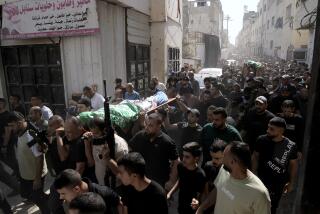MAKING A NEW MIDDLE EAST : Valley’s Jews and Muslims Express Hopes, Fears Over Pact : Treaty: Most agree that reconciliation will be a long process, but the signing will lead to peace.
Whether the discussions were among Muslims or Jews, the same amalgam of hope and worry emerged Monday as Israeli and Palestinian representatives signed a historic peace pact.
Among 39 rabbinical students who talked about the peace framework, Michelle Goldsmith of Van Nuys said she had one clear emotion:
“If I don’t have to see any more images of 5-year-olds wearing gas masks, I will be very happy,” Goldsmith said at the weekly meeting of future rabbis studying at the University of Judaism on Mullholland Drive. “I feel very happy for the mothers and families of children.”
Reconciliation and peace in Israel and Palestine will be a long, hard process, most agreed, but a few also wondered philosophically what will happen to those American Jews whose reason for being ardently Jewish has been linked to the need to support an Israel at war.
At the Islamic Center of Northridge, which has about 50 Palestinian families, reaction differed sharply among some couples who stopped by for early afternoon prayer.
Yusuf Kafity and his wife Bothania had watched the signing on television with hope and anticipation.
“It’s a historic moment for me,” said Kafity, who immigrated from Jerusalem 23 years ago. “We both were in tears. We’re all for peace. If peace happens, they’re on the right path. . . . Nothing can be solved with a cannon or a gun.”
Kafity is hopeful that the signing will eventually lead to a lasting settlement, where the two warring sides can “live in peace and harmony next to each other.”
But for Yasser and Shadia Masri, who live in Chatsworth, the signing represents a step backward for Palestinians.
“I’m so depressed today,” Yasser Masri said. “I was watching the whole ceremony today. It looks like the Israelis are getting the upper hand over the Palestinians. I don’t think the Palestinians are getting their fair share of their homeland.”
A mechanical engineer who came to the United States 15 years ago, Yasser said the signing would solidify Israeli strength in the region and further encourage the emigration of Jews from the Soviet Union and other countries who take “the land and property of Palestinians who were living there hundreds of years.”
Masri estimated that about 45-50% of Palestinians in the Gaza Strip are supporters of Hamas, rivals of the Palestinian Liberation Organization, and that the PLO is being used by Israel as a buffer.
“This is one way to finish Hamas and to finish the intifada,” Masri said. “This is a celebration for the Jews, not the Palestinians,” he said.
At the University of Judaism, Rabbi Elliott Dorff, who is also provost of the school aligned with the Conservative wing of Judaism, presided over the regular meeting of rabbinical students.
“As rabbis, you’re going to be doing a lot of ceremonies,” said Dorff, who pointed to the psychological significance of the Washington ceremony bringing together former enemies Yassar Arafat of the PLO and Israeli Prime Minister Yitzhak Rabin. “A ceremony calls to everyone’s attention that this is reality; a ceremony hopes that people come to acknowledge reality.”
Joseph Mendelsohn, at 43 perhaps the oldest rabbinical student, said his daughter will move to Israel in a month, and he has deep-seated fears.
But, Mendelsohn added, Palestinians and Israelis at the neighborhood level often tend to accommodate each other. “Ordinary people have to barter and get along,” he said. “The leaders have to stop being politicians and allow the people to coexist.”
More to Read
Sign up for Essential California
The most important California stories and recommendations in your inbox every morning.
You may occasionally receive promotional content from the Los Angeles Times.









